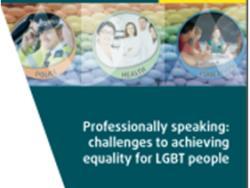European teachers still hold homophobic/transphobic attitudes

16 March 2016 - In a new report launched in the European Parliament today, the EU’s Fundamental Rights Agency (FRA) present survey results that show how teachers in Europe still hold negative attitudes towards LGBT people. Such unprofessional attitudes threaten the human rights of LGBT students. They also hamper the battle against discrimination and hate crime.
Lack of objective information in schools
The FRA report "Professionally speaking: challenges to achieving equality for LGBT people" analyses the views and attitudes of the so-called duty bearers towards LGBT persons in the field of education, but also in the fields of law enforcement and healthcare. The key findings include:
- There is a lack of objective information on sexual orientation and gender identity in schools. This can result in bullying, and force LGBT youths to hide their sexual orientation or gender identity.
- All professional groups have low levels of awareness and knowledge about LGBT needs. Their social attitudes are often hostile towards LGBT people. These negative attitudes lead to negative behavior.
- Law enforcement personnel often lacks awareness about the discrimination LGBT people face and have insufficient knowledge of their vulnerability to hate crimes.
- There is a need for professional training to help counter prejudice in healthcare. Healthcare services to trans people are spread unevenly across the EU and there is a need to strengthen capacity and awareness of healthcare providers.
European parliament LGBTI intergroup calls for more action
The report recommends that Member States should work with education authorities and schools to formulate targeted campaigns to help make schools a safer and friendlier place for LGBT people.
EU law and policy are seen as major drivers supporting national efforts to promote LGBT equality.
Reacting to the report, LGBTI Intergroup Vice Chair Fabio Massimo Castaldo, said: “Why do some doctors still believe homosexuality is a disease? Why are schools too often still unsafe places for LGBTI people? (...) We need to work much harder to ensure that the rights to education, to healthcare and fair treatment is equally enjoyed by all.”
Sirpa Pietikäinen, also Vice-Chair of the Intergroup on LGBTI Rights, added: “The results of this report are a good reminder that despite improvements in the legal situation, we are not there. Prejudice, discrimination and violence still hold back LGBTI people from accessing school, hospitals and the police.”


